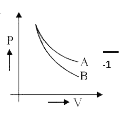The work done by one mole of ideal gas when its teperature is increased by 1oC at constant pressure is
R2
2R
R
4R
The correct Answer is:C
To solve the problem of finding the work done by one mole of an ideal gas when its temperature is increased by 1∘C at constant pressure, we can follow these steps:
Step 1: Understand the relationship between work, pressure, and volume
The work done W by an ideal gas at constant pressure can be expressed as:
W=−PΔV
where P is the pressure and ΔV is the change in volume.
Step 2: Use the ideal gas law
The ideal gas law states:
PV=nRT
where:
- P = pressure,
- V = volume,
- n = number of moles,
- R = universal gas constant,
- T = temperature in Kelvin.
Step 3: Determine the change in volume
When the temperature increases by 1∘C, we can express the change in temperature as:
ΔT=1∘C=1 K(since 1∘C=1 K)
Using the ideal gas law, we can find the change in volume:
ΔV=nRΔTP
Substituting n=1 mole and ΔT=1 K, we get:
ΔV=1⋅R⋅1P=RP
Step 4: Substitute ΔV back into the work formula
Now, substituting ΔV into the work equation:
W=−PΔV=−P(RP)=−R
Step 5: Determine the magnitude of work done
The work done is negative, indicating that work is done on the system. However, if we are interested in the magnitude of the work done, we take the absolute value:
|W|=R
Conclusion
Thus, the work done by one mole of an ideal gas when its temperature is increased by 1∘C at constant pressure is:
Work done=R
The work done W by an ideal gas at constant pressure can be expressed as:
W=−PΔV
where P is the pressure and ΔV is the change in volume.
The ideal gas law states:
PV=nRT
where:
- P = pressure,
- V = volume,
- n = number of moles,
- R = universal gas constant,
- T = temperature in Kelvin.
When the temperature increases by 1∘C, we can express the change in temperature as:
ΔT=1∘C=1 K(since 1∘C=1 K)
Using the ideal gas law, we can find the change in volume:
ΔV=nRΔTP
Substituting n=1 mole and ΔT=1 K, we get:
ΔV=1⋅R⋅1P=RP
Now, substituting ΔV into the work equation:
W=−PΔV=−P(RP)=−R
The work done is negative, indicating that work is done on the system. However, if we are interested in the magnitude of the work done, we take the absolute value:
|W|=R
Thus, the work done by one mole of an ideal gas when its temperature is increased by 1∘C at constant pressure is:
Work done=R
Topper's Solved these Questions
Similar Questions
Knowledge Check
- Question 1 - Select One
What will be the work done when one mole of a gas expands isothermally from 15 L to 50 L against a constant pressure of 1 atm at 25∘C?
A−3542calB−843.3calC−718calD−60.23cal - Question 2 - Select One
What is the work done when 1 mole of a gas expands isothermally from 25 L to 250 L at a constant pressure of 1 atm and a temperature of 300 K ?
A(a) −3542JB(b) −5744JC(c) −2657JD(d) −4890J
Temperature of 1mol of a gas is increased by 1∘ at constant pressure. The work done is
View SolutionThe work done by 1 mole of ideal gas during an adiabatic process is (are ) given by :
View SolutionWhat will be the work done on an ideal gas enclosed in a cyliner, when it is compressed by a constant external pressure, pext in a single step as shown in figure ? Explain graphically.
 View Solution
View SolutionTemeprature of 1 mole of a gas is increased by 2∘ at constant pressure, then work done is :
View SolutionTemperature of one mole of a gas is increased by 1∘ C at constant pressure. The work done on the system is
 View Solution
View SolutionCalculate the work done when 1 mol of an ideal gas is compressed reversibly from 1 bar to 4 bar at a constant temperature of 300 K
View Solution
